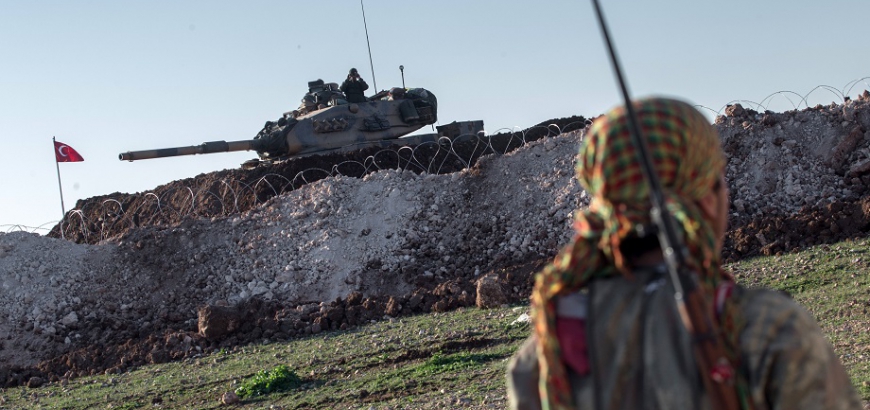Operation Olive Branch, which Turkey began with participation from Syrian rebel groups in the city of Afrin, represented a blow for the Kurdish People’s Protection Units (YPG) militia, the top United States ally in Syria, and exposed the reality of the alliances among the powers active on Syrian territory.
Even before Jan. 20, the date on which Turkish President Recep Tayyip Erdogan announced the start of the campaign, many questions had been raised around the positions of both the United States and Russia — the most prominent of which was: “Will Washington and Moscow accept a military operation against Kurdish fighters who have entered into an alliance with the two countries?”
Facts on the ground indicate that the wind did not blow as was desired by the Kurdish fighters on the Turkish border, whom Ankara considers a terrorist group as an extension of the Kurdistan Workers’ Party (PKK), which America and Turkey name on its terrorist lists.
It seems that the Kurdish militias in Syria felt reassured that they would find their allies by their side when Turkey moved from threats into action, in response to the Kurds over the last two years weaving alliances — clear in some aspects and complicated in others — with both America and Russia, who are competing for influence in Syria.
United States support for Kurdish forces in Syria had been a main reason for worsening relations between Ankara and Washington, which grew even worse after U.S. President Donald Trump arrived to the White House and adopted a policy of greater military support for Kurdish fighters, thereby gambling his country’s relations with an old ally and NATO member Turkey.
Ankara has repeatedly demanded that Washington stop arming the Kurdish militias on the border with Turkey, which the American administration has ignored. However, the announcement by the U.S.-led international coalition of the creation of a “Border Security Force” composed of 30,000 fighters, most of them from Kurdish militias, was a turning point for Turkey, which pushed it to the urgent action we are now seeing in Afrin, according to the Turkish political analyst Mustafa Ozcan.
It seems that Russia, when faced with a decision between two of the sides it works with in Syria, decided to go with Turkey rather than the Kurdish fighters in Afrin because of a network of complicated issues which the two countries are working on. Ankara, rather than the Kurds, is more important to Moscow in order to achieve important gains.
Alongside the joint issues which Turkey and Russia are working on in Syria, especially with regards to President Bashar al-Assad’s future in power, the importance of economic relations between Ankara and Moscow cannot be ignored. It is possible these relations would face obstacles in the event that Moscow derailed Ankara’s operation in Afrin.
Analysts expect that the Kurds’ relations with Russia and America after Operation Olive Branch will change, especially with the Kurdish militias’ doubts in their allies growing, along with their fear that they will be abandoned “overnight,” as YPG commander Siban Hamou described Russia’s position on the Turkish army’s operation.
Even though the United States justified its lack of intervention in Afrin by saying the city was not within the areas of the international coalition’s operations, the feeling of betrayal among the Kurdish forces in Syria will be generated, as the belief prevails that American support is limited in the end to the areas rich with oil and gas and farmlands where they are present. This also means that Washington, in light of its announcement that it will remain in Syria for the long term, will in the end be inclined to achieve its interests regardless of the entity it is allied to.
This article was translated and edited by The Syrian Observer. Responsibility for the information and views set out in this article lies entirely with the author.


